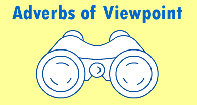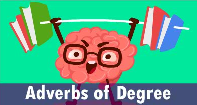Change Avatar
What are Adverbs
Adverbs
What are Adverbs?
Adverbs are a special part of speech used in the English language that change or add to the meaning of the verb in the sentence. You can use one or more adjectives in a row to add meaning to the verb. It describes the manner in which an action happened or the state of being of a condition or situation.
If you think of it as “adding to the verb,” you’ll never go wrong!
They add specific description to the sentence in order to help the reader or listener understand more clearly the meaning of the speaker. They often refer to the cause, degree, exception, manner, means, place, result, or time, etc. of the verb. You can also string a group
How do you form an Adverbs?
Often adverbs end in -LY, -ALLY, or -ILY. They are formed by taking an adjective and adding the ending -LY, -ALLY, or -ILY.
Ends in a consonant: ADD -LY
| He talked slowly. | SLOW + -LY=SLOWLY |
| I ran quickly across the street. | QUICK + -LY=QUICKLY |
Ends in “y”:
Remove the “y” & replace with “-ily”
We happily agreed to go to the fair.
HAPPY = HAPP- + -ILY = HAPPILY
Ends in “-able,” “-ible,” or -le”:
Remove the “e” & replace with a “y”
I will probably go to the beach.
PROBABLE = PROBABL- + -Y = PROBABLY
You are audibly upset from the game.
AUDIBLE = AUDIBL- + -Y = AUDIBLY
Ends in “-ic”:
Remove the “ic” & add “ally”
I am basically done with my homework.
BASIC = BASIC + -ALLY = BASICALLY
You can see in these two examples, the adverbs add extra meaning to the verb to be more specific or descriptive.
What are some commonly used Adverbs?
Commonly used adverbs that end in -LY are as follows:
| Accidentally | Angrily | Deliberately | Eventually | Exactly |
| Finally | Fortunately | Frequently | Honestly | Quickly |
| Seriously | Slowly | Unfortunately | Usually |
What about Adverbs that don't end in -LY?
However, you’ll be surprised to know that many commonly used adverbs do NOT end in -LY. As long as a word is adding meaning to the verb, it is considered to be an adverb.
So, for example, here are some common adjectives that don’t end in -ly:
| also | already | always | back | better |
| down | even | far | fast | here |
| how | just | in | late | long |
| more | most | near | never | now |
| often | only | out | rather | really |
| so | still | too | then | there |
| up | very | well | when | yesterday |
What are the different types of adverbs?
There are 8 basic types of adverbs that you can explore more by clicking below:
| Time | Place | Manner | Degree |
| Frequency | Comment | Conjunction | Confirmation & Negation |
Similar Games










